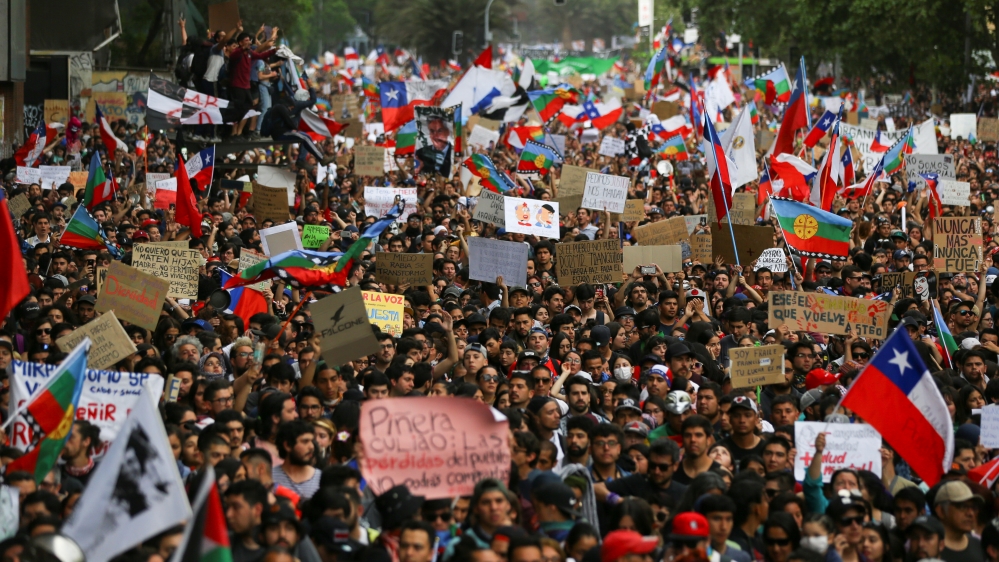
Santiago – Chile’s state of emergency will end at midnight on Sunday, the president’s office has confirmed, after more than a week of military presence and widespread unrest across the country.
President Sebastian Pinera’s office released a statement earlier on Sunday, announcing the state of emergency, which saw more than 20,000 soldiers and police deployed on Chile’s streets, would end “in all the regions and towns where it was established” in a bid to “restore institutional normality”.
More:
The statement comes a day after the military lifted curfews in Chile’s main cities and the president announced plans for a major cabinet reshuffle in a desperate attempt to quell furious protests over inequality and calls for political and economic change.
“We are in a new reality. Chile is different from what it was a week ago,” Pinera said following a historic demonstration on Friday that saw more than one million people protest against his government in Santiago.
Sunday’s short statement came as tens of thousands of people marched to the congress building in Valparaiso, a hugely symbolic protest in Chile’s coastal city. Meanwhile, various protest concerts with famous Chilean artists attracted thousands across Santiago.
With many more demonstrations planned for this week, Pinera’s reforms have done little to answer the rallying cries for systemic change. Posters and graffiti across the capital call for the president’s resignation, but many Chileans are now also demanding a new political constitution, which remains a legacy of Chile’s military dictatorship.
Approval rating at new low
A national survey, published on Sunday by pollster and national research institute Cadem, found 80 percent of Chileans did not think the reforms were enough. Support for Pinera had dropped to 14 percent, the lowest approval rating for a president since the country’s return to democracy in 1990, the poll found.
“We can’t stop now,” said 61-year-old Hector Parrera, who attended a free concert for “the right to live in peace” in Santiago. “I don’t know if the resignation of Pinera will do anything, because we need to change this whole system. We have to change this constitution of [Augusto] Pinochet.”
The state of emergency was first introduced in Santiago in the early hours of October 19 following vandalism and violent clashes with police after a protest against a rise in metro fares escalated into wider unrest. Chileans have since united against the high cost of education and healthcare, low pensions, stagnant wages, and the cost of living in one of Latin America’s most unequal countries.
As protests spread throughout the week, so did the state of emergency, bringing military and armoured vehicles back to Chile’s streets as an ominous reminder of the country’s 17-year dictatorship.
Established by Pinochet’s constitution, the state of emergency granted the government additional powers to restrict freedom of movement and right to assembly.
UN investigators to arrive on Monday
The state of emergency will be lifted in time for the arrival of a team from the United Nations’s human rights commission on Monday, who plan to investigate multiple allegations of abuse, excessive force, and even torture, at the hands of police and military forces during the unrest.
Chile’s human rights institute, the INDH, has filed 88 judicial actions outlining human rights abuses – 17 of which are for sexual violence. At least 19 people have died during the uprising, with five killed by armed forces. More than 1,000 people are being treated for injuries in hospital, including 546 with wounds from firearms.
The INDH’s chief said in an interview with CNN Chile that what “worries us most” are the allegations of torture and sexual violence.
Ravina Shamdasani, the spokeswoman for the UN High Commissioner for Human Rights, said the organisation had received allegations of violations of international standards “relating to the use of force by state security forces”, and crimes committed by third parties.
“We have been closely monitoring the mounting crisis in Chile, including reports of human rights violations and abuses in the context of the recent protests and the declaration of a state of emergency,” she said.
The human rights team plan to spend a month in Chile investigating the allegations.







![Police officers detain a demonstrator during a protest against Chile's state economic model in Santiago, Chile [Henry Romero/Chile] Chile military](http://www.aljazeera.com/mritems/Images/2019/10/27/ba47cf7398984d808acff4dd9cf9e97d_18.jpg)






